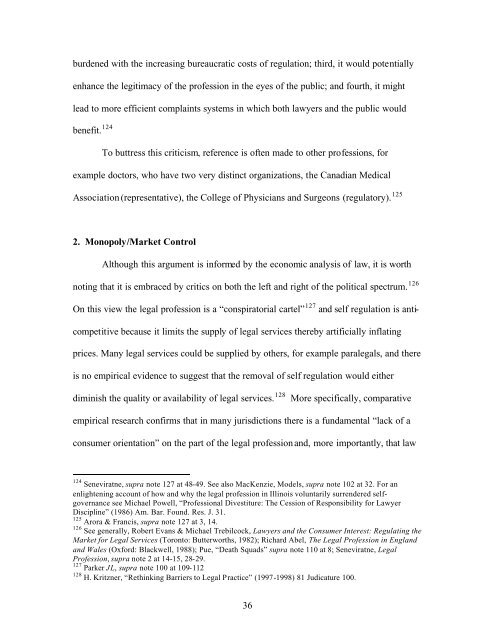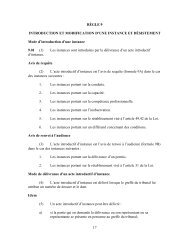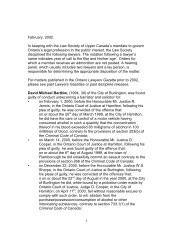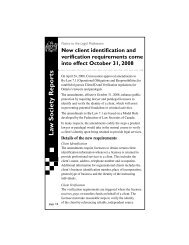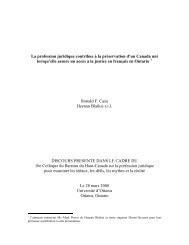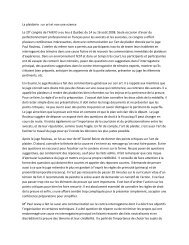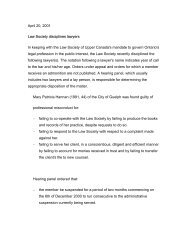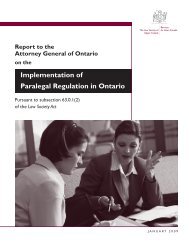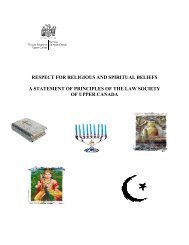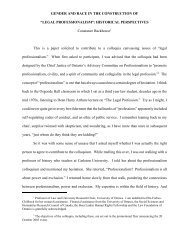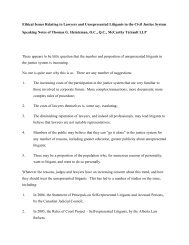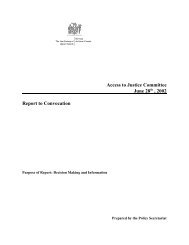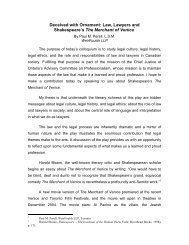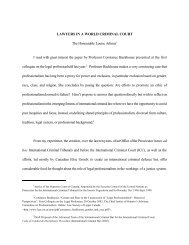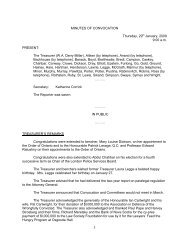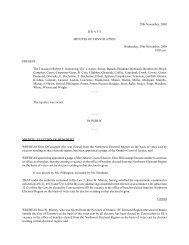of self regulation? - The Law Society of Upper Canada
of self regulation? - The Law Society of Upper Canada
of self regulation? - The Law Society of Upper Canada
You also want an ePaper? Increase the reach of your titles
YUMPU automatically turns print PDFs into web optimized ePapers that Google loves.
urdened with the increasing bureaucratic costs <strong>of</strong> <strong>regulation</strong>; third, it would potentially<br />
enhance the legitimacy <strong>of</strong> the pr<strong>of</strong>ession in the eyes <strong>of</strong> the public; and fourth, it might<br />
lead to more efficient complaints systems in which both lawyers and the public would<br />
benefit. 124<br />
To buttress this criticism, reference is <strong>of</strong>ten made to other pr<strong>of</strong>essions, for<br />
example doctors, who have two very distinct organizations, the Canadian Medical<br />
Association (representative), the College <strong>of</strong> Physicians and Surgeons (regulatory). 125<br />
2. Monopoly/Market Control<br />
Although this argument is informed by the economic analysis <strong>of</strong> law, it is worth<br />
noting that it is embraced by critics on both the left and right <strong>of</strong> the political spectrum. 126<br />
On this view the legal pr<strong>of</strong>ession is a “conspiratorial cartel” 127 and <strong>self</strong> <strong>regulation</strong> is anticompetitive<br />
because it limits the supply <strong>of</strong> legal services thereby artificially inflating<br />
prices. Many legal services could be supplied by others, for example paralegals, and there<br />
is no empirical evidence to suggest that the removal <strong>of</strong> <strong>self</strong> <strong>regulation</strong> would either<br />
diminish the quality or availability <strong>of</strong> legal services. 128<br />
More specifically, comparative<br />
empirical research confirms that in many jurisdictions there is a fundamental “lack <strong>of</strong> a<br />
consumer orientation” on the part <strong>of</strong> the legal pr<strong>of</strong>ession and, more importantly, that law<br />
124 Seneviratne, supra note 127 at 48-49. See also MacKenzie, Models, supra note 102 at 32. For an<br />
enlightening account <strong>of</strong> how and why the legal pr<strong>of</strong>ession in Illinois voluntarily surrendered <strong>self</strong>governance<br />
see Michael Powell, “Pr<strong>of</strong>essional Divestiture: <strong>The</strong> Cession <strong>of</strong> Responsibility for <strong>Law</strong>yer<br />
Discipline” (1986) Am. Bar. Found. Res. J. 31.<br />
125 Arora & Francis, supra note 127 at 3, 14.<br />
126 See generally, Robert Evans & Michael Trebilcock, <strong>Law</strong>yers and the Consumer Interest: Regulating the<br />
Market for Legal Services (Toronto: Butterworths, 1982); Richard Abel, <strong>The</strong> Legal Pr<strong>of</strong>ession in England<br />
and Wales (Oxford: Blackwell, 1988); Pue, “Death Squads” supra note 110 at 8; Seneviratne, Legal<br />
Pr<strong>of</strong>ession, supra note 2 at 14-15, 28-29.<br />
127 Parker JL, supra note 100 at 109-112<br />
128 H. Kritzner, “Rethinking Barriers to Legal Practice” (1997-1998) 81 Judicature 100.<br />
36


